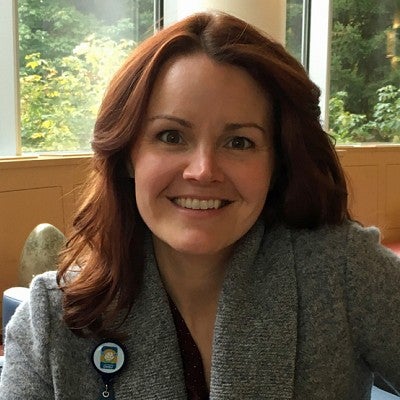For the next year Liberty Barnes, a postdoctoral fellow in sociology, will spend a lot of time in a children's hospital shadowing and questioning everyone from staff members to pediatric doctors as they go about their jobs.
She's on a mission, funded by a two-year National Science Foundation fellowship, to "connect the dots between modern childhood and modern medicine." Her project, being pursued with help from her sociology mentor, C.J. Pascoe, aims to understand how beliefs about children and philosophies of medical care influenced each other from past to present.

"Children have traditionally not been taken seriously by social science researchers as social actors in their own right," Pascoe said. "Instead they are treated as people in the process of becoming fully human. What is so exciting about this project is that children’s experiences are at the center. By taking seriously their medical care, their experiences of medical care and how caregivers — both familial and medical — make decisions about and understand their care, this research has the potential to reshape how we care for some of some of the most vulnerable members of our society."
The culmination of the project will be a book about the culture of pediatric medicine. Barnes says that she hopes the book will be useful to her social science colleagues as well as medical students, pediatric practitioners, hospital administrators, social workers, child-life counselors and educators in their dealings with patients and their families. Barnes also plans to keep a blog to help online networks of families dealing with children in medical crisis.
"In the social sciences we think of childhood, as we know it today, as a modern invention," said Barnes, who earned her doctorate at the University of California, San Diego. "Yes, human beings have always started out as babies and grown into adults, but our whole idea of what it means to be a kid in America is actually a very modern phenomenon."
It wasn't until the late 19th century, she said, that people accepted the notion that children should be getting an education instead of working 16 hours a day in factories and that orphans needed government-supported care. "Many of the rights and protections children enjoy today were instituted in the last century," she said.
At around the same time, pediatrics as a medical specialty also was founded.
"In other words, modern childhood and pediatric medicine were conceived at the same time and we argue that that is not a coincidence," Barnes said.
In the research, Barnes and Pascoe will look closely at the culture of pediatric medicine to understand what makes children’s hospitals so unique and special.
"People often tell me that the children’s hospital 'feels different' and in a good way," Barnes said. "We suspect the answer goes deeper than the superhero posters on the wall and free stickers. Deep-seated beliefs about what childhood is and what children deserve are shaping how these institutions are structured and funded and even how medical decisions get made. Perhaps the most fascinating aspect of pediatric medicine is how much we, modern society, take it all for granted."
In addition to a year doing ethnographic research — an approach that puts an observer into a natural setting — Barnes will interview hospital staff about their careers and driving philosophies. She also will talk with families of patients to explore their experiences. The project, which will involve other pediatric hospitals during the interview process, also will seek to identify inequities in the delivery of pediatric health care.
"Professor Pascoe has extensive experience studying childhood and youth cultures," said Barnes, whose background is in medical sociology. "She is challenging me to think about the social construction of childhood in compelling ways. By combining our expertise, I think we can break new ground in sociology. We hope our findings will help identify ways to better support families with sick children and suggest ways to apply the strengths of pediatric medicine to adult care."
The $120,000 fellowship issued by the NSF's Division of Social and Economic Sciences runs through Aug. 31, 2018.
—By Jim Barlow, University Communications
C.J. Pascoe is an expert on sexuality, gender, masculinity, transgender issues and body image, especially related to youth. Learn more about Pascoe, and find more UO experts on the Media Relations website.


